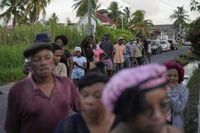In a pivotal moment for Guyana’s political and economic future, preliminary results from this week’s general election indicate President Irfaan Ali is on track to secure a second term, as his People’s Progressive Party (PPP) leads the race for control of the country’s 65-seat Parliament. The election, held on Tuesday, September 2, 2025, is widely regarded as the most consequential in decades, with the stakes amplified by Guyana’s transformation into one of the world’s fastest-growing economies thanks to a massive offshore oil boom.
According to the electoral commission’s Friday announcement, the PPP has claimed about 35 seats, placing it comfortably ahead of its rivals. The emergence of a newcomer, We Invest in Nationhood (WIN), has upended the traditional political order. Founded only in May, WIN has surged into second place with roughly 17 seats, pushing the long-dominant A Partnership for National Unity (APNU) into third with about 11 seats—a dramatic reversal for the coalition that governed from 2015 to 2020. Ongoing recounts, demanded by both WIN and APNU, have delayed the official final results, but these are expected by Saturday, September 6. President Ali’s office has already issued invitations for a swearing-in ceremony scheduled for Sunday.
Guyana, a nation of approximately 850,000 people with 757,000 eligible voters, saw a turnout of 52%—down from 70% in the 2020 election, according to figures reported by the Associated Press. The lower turnout has been attributed to a combination of voter fatigue and shifting political allegiances, as new parties like WIN attracted significant support from younger and first-time voters.
The backdrop to this election is nothing short of extraordinary. Guyana has experienced a seismic economic shift in recent years, moving from a reliance on gold, sugar, rice, bauxite, and timber to reaping the rewards of nearly 900,000 barrels of oil produced daily. The World Bank has noted that Guyana’s gross domestic product has increased by an average of 15% annually over the past six years, making it the fastest-growing economy on the planet. With ExxonMobil leading an international consortium and applications for four more oil fields pending, the promise of even greater oil revenue looms large.
President Ali, a 45-year-old urban planner, has staked his campaign on the promise of using this newfound wealth to benefit ordinary Guyanese. Since taking office, he has overseen a wave of construction—new hospitals, highways, and infrastructure projects. His administration is set to begin offering free college tuition this month, and he has pledged to double monthly pensions for those over 65 to $500, raise the minimum wage, and cut power bills in half by next year. Speaking to supporters at a coastal rally on the eve of the election, Ali declared, “We ask you to trust us once more to deliver greater, better, faster and more efficiently. We have the experience, and you can trust us to lead you into the bright prosperous future ahead of us.”
Yet the opposition has not been silent. Aubrey Norton, the 68-year-old leader of APNU, accused the PPP of corruption, nepotism, harassment of opposition voices, and irresponsible use of oil revenues. “Our aim is to restore decency in Guyana, to restore law and order, and to lift the people of Guyana out of poverty. We want to build a society that truly serves its people and ensures that every Guyanese benefits from our nation’s oil wealth,” Norton told a massive rally, echoing concerns among some voters that the country’s oil riches have not been shared equitably.
For some, the monthly state pension of $200 simply isn’t enough in a country flush with oil money. “What they give us is way not enough. I would like to see that people are lifted out of poverty,” said Evelyn Crawford, a 75-year-old retiree, as she left a polling station.
However, the most surprising development has been the meteoric rise of WIN, led by 38-year-old billionaire Azruddin Mohamed. Despite being sanctioned by the U.S. Treasury in 2024 for alleged public corruption—a charge he vehemently denies—Mohamed’s party has captured the imagination of many, especially among the young and working-class communities. Mark Kirton, a retired international relations professor from the University of the West Indies, noted, “Mohamed de-intellectualized politics. He did not worry about things like fiscal policies and GDP. He addressed the needs of poor people with cash and other gifts and appealed to youth. In the absence of any counter, that kind of approach must resonate with voters.”
WIN’s rapid ascent is remarkable, given that it was only formed three months ago. The party’s message—anchored in the idea that Mohamed, already wealthy, has no need to enrich himself at the public’s expense—found traction with first-time voters like DeLinda Henry, an Indigenous mother of four. “It is time to try something else other than the PPP and the APNU. I am supporting WIN because Mr. Mohamed does not need to steal any money. ...He is a billionaire and has lots of his own,” she told the Associated Press.
Mohamed’s personal and business fortunes have suffered in recent months. Authorities shuttered his gold purchasing and exporting firm, closed his foreign exchange dealership, and disarmed his extensive security system. Commercial banks have also closed all his personal and company accounts. Yet these setbacks did little to dampen his campaign, with WIN winning two districts outright and positioning Mohamed as the likely new opposition leader when Parliament convenes later this month.
The international community has watched the election closely, given Guyana’s strategic significance and the billions at stake. The U.S. government has expressed deep concern about Mohamed’s participation in government, with Ambassador Nicole Theriot stating, “We wouldn’t be able to work directly with Mr. Mohamed in any sort of transaction or financial situation, but we will be able to work with other parliamentarians and other people.” She added, “You just have to be creative in ways to work around it.” The U.S. has signaled that companies may avoid doing business with Mohamed or any committees he oversees, raising questions about how Guyana’s new Parliament will navigate these diplomatic and economic challenges.
The election was not without incident. On Sunday, members of Guyana’s election commission, escorted by police and soldiers, came under fire while traveling on a river near the Venezuelan border—a region long claimed by Venezuela. Thankfully, no one was injured and election materials were unharmed. Several international groups, including The Carter Center, the Organization of American States, and Caricom, were on the ground to monitor proceedings. The Carter Center criticized the size of Guyana’s voter list and the lack of a recent census, calling it a “regrettable lapse” that obscures public understanding of the electorate.
With the final results expected imminently and the swearing-in of President Ali set for Sunday, Guyana stands at a crossroads. The outcome of this election will determine not only who controls the levers of government but also how the country’s extraordinary oil wealth is managed—and who will benefit from the prosperity it promises.


